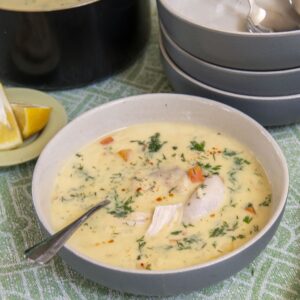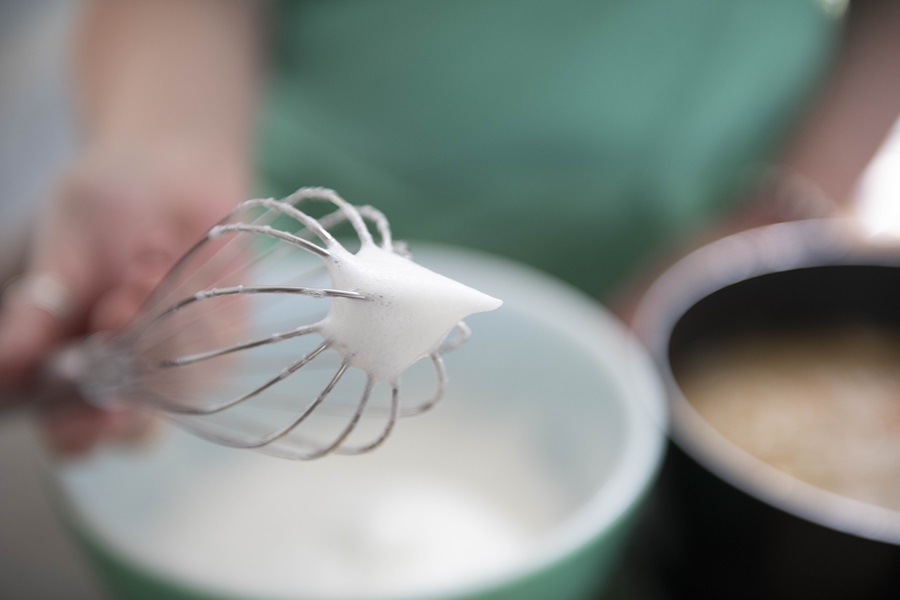That lady you saw make a U-turn on Route 6 just past the handwritten roadside sign advertising “Fresh Eggs”? That might have been me. Besides that there’s no comparison between farm eggs and their industrial doppelgängers, I am seduced by our local honor system: a cooler of backyard eggs and a money box. This neighborly supply chain speaks to how I want to live and eat.

The potential in an egg seems to me to border on the magical. I can’t resist all the possibilities packed in that humble cardboard carton of blue, white, and brown eggs: Yolks become elegant pastry cream, mayonnaise made with farm yolks emulsified with a good olive oil is wholly other than the commercial stuff in jars, and angel food cake and souffles get their lift from peaks of beaten whites.
When spring temperatures swing warm and cold, I am drawn to the ways eggs can be used in soups. Often these are the genius of country cooks using what’s at hand to make something delicious, like Portuguese garlic soup with poached eggs, the broth thickened with day-old bread, or Chinese egg drop or Italian stracciatella, which both involve drizzling beaten eggs into hot broth to lacy effect.
With my newly acquired Wellfleet eggs, a bowl of lemons on my counter, and my garden’s first herbs growing tall, I’ve had avgolemono on my mind. This classic gets its name from avgo for the eggs and lemono for the generous amount of bright citrus juice.

When I was teaching at a French cooking school, my mother never stopped asking, her voice filled with awe, “You can really make hollandaise?” I reminded her it was part of the job description. Successfully cooking eggs means moderating the heat as they firm up. Gentle heat is generally the way to go. A key technique for sauces, custards, or soups is to temper the eggs. At the cooking school, avgolemono was the way we taught cooks how to do that.
By slowly adding some of the hot broth first to the eggs, they come up in temperature slowly. Then they’re returned to the soup and cooked gently over low heat. This gradual rise in temperature keeps the eggs’ proteins from coagulating, or in cooks’ shorthand, “breaking.” It’s a luxurious way to thicken a soup without cream or flour. The same technique is used with hot cream to make custards.
In our eggs classes, we used only the yolks for avgolemono. But this spring I came across a fascinating technique from Diane Kochilas, the Greek American cookbook author. She separates the yolks and whites, then beats the whites until they’re stiff and the yolks until they’re thickened before whisking the two together and tempering them into the soup.

I had to try it. It took a little elbow action to beat the whites and yolks, but there was a marked difference in the final soup. It was light and lush at the same time and more stable at the final cooking. I loved this bright soup. And the next day a bit of leftover soup set in the fridge from the rice’s natural starch into a surprisingly yummy savory rice pudding.
There are lots of ways to approach this soup. Use a prepared broth and rotisserie chicken and you’ll have a satisfying meal in under 30 minutes. Or focus on each element, starting with a flavorful homemade stock (extra good if you add the frozen chicken feet found, miraculously, in the freezer case at the Orleans Stop & Shop). Poach the chicken gently until just done and use a fragrant rice like jasmine or basmati. Either way, use fresh lemon juice. That fake stuff called “Real Lemon” has no place here.
Eating my new favorite avgolemono, I thought of Maurice Sendak’s Chicken Soup With Rice: A Book of Months, which includes this entry for May:
In May
I truly think it best
to be a robin
lightly dressed
concocting soup
inside my nest.
Mix it once
mix it twice
mix that chicken soup
with rice.
GREEK EGG-LEMON SOUP
Makes 2 to 4 servings
6 cups chicken broth, preferably homemade
1 large chicken breast or 2 thighs, on the bone (or 1-2 cups cooked, shredded chicken)
2 lemons, plus 1 more for serving, if desired
3-5 whole garlic cloves, peeled
1/3 cup white rice, preferably jasmine or basmati
1 carrot, diced
Kosher salt and freshly ground pepper
3 large eggs, separated
1-2 Tbsps. chopped parsley or other herbs such as chives, chervil, or mint
2 Tbsp. chopped dill, plus more for the garnish
A pinch of paprika, optional
- Put the broth in a medium-large pot with the uncooked chicken, if using, 3 wide strips of lemon zest, and the garlic cloves. Set over medium-low heat and gently poach until the chicken is just cooked, 15-20 minutes. Remove chicken and set aside to cool.
- Add the rice, carrot, and ½ teaspoon salt to the broth and simmer until the rice is tender, about 20 minutes. Meanwhile, separate the eggs, juice two of the lemons, and cut the remaining lemon, if using, into wedges.
- When the rice is tender, add about half the lemon juice to the soup pot. Whisk the remaining juice with the yolks until slightly thick and frothy. Then beat the egg whites until they hold a stiff peak. Whisk the yolks into the whites.
- To temper the eggs into the soup: Remove the soup from the heat; while whisking the eggs constantly, gradually ladle about 2 cups of the hot soup into them. Then gradually add the heated eggs to the soup, again whisking constantly. Return the soup to low heat and stir constantly until it thickens, about 2 minutes (a rubber spatula stirred in a figure 8 along the sides of the pan works best here).
- Add the shredded chicken and the herbs to the soup, stirring until heated through. Season with salt and pepper to taste. Remove from heat and ladle soup into bowls. Top with dill fronds and a sprinkle of paprika and serve with lemon wedges.
Take care when reheating leftovers so the eggs don’t boil and break; the soup is also good cold.



